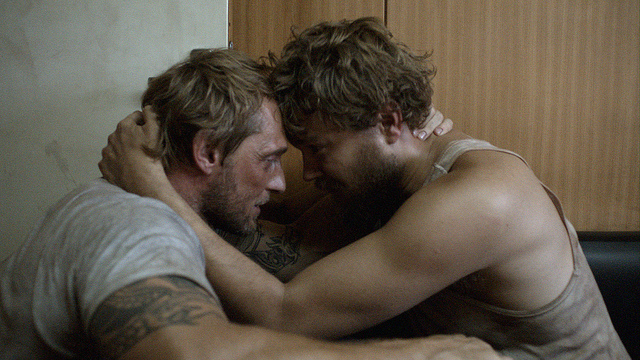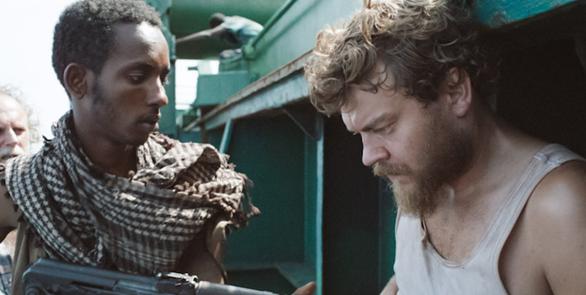Director Tobias Lindholm’s first feature film R was a gritty prison drama that upheaved the generic genre conventions that came before. His second feature takes a drastic look at a very topical subject, and one very much ignored in detail in the media–except for the sensationalizing of pirates sailing the open sea. A Highjacking is the story of a group of crew members aboard a Danish ship headed to Mumbai, sailing in waters that are not common territory for water-bound highjacking. Never say never is the shocking truth that A Highjacking brings to life, with as much intensity and claustrophobia possible. Highjacked by a group of Somali pirates, the crew is attacked without notice; their predicament only known to the shipping company they work for from a final message sent from the crew’s Captain, and thanks to modern technology the knowledge that the ship’s speed has slowed considerably. A Highjacking quickly becomes a harrowing journey for those on board the ship, but more so, and far more interesting to a viewing audience member, is what goes on in the boardroom, as the lives of the crewmen are negotiated by the company’s CEO. On the ship the face of the crew, the man with the most to lose and who experiences the greatest of terror is the Cook–simplicity and the common man used to great effect.

Any form of highjacking, kidnapping, or the like, is a frightening experience to witness; and a most difficult one to portray on film. The emotional turmoil the crew member’s feel, the extreme circumstances they encounter, the life changing horrors witnessed, and the overall disturbing nature of their experience can easily be drawn out as overly melodramatic or mundane and predictable. Director Tobias Lindholm succeeds at avoiding the pitfalls, and in turn focuses on the highly claustrophobic nature of the highjacking experience, both on the ship and in the boardroom; the result is a movie that does not allow for breath. The entire film moves between the confinement of the hostages on the ship and the seclusion the CEO and his advisors feel during the negotiations.
The crew is left to a small space, living in their own excrement, unable to go outside for fresh air, and incapable of communication with their captors. Food is scarce, violence always hanging over their heads as guns are carried at all times. Negotiations are solely in the hands of their employer, and life or death hangs on a dollar figure. The CEO is tense, approachable, and concerned, but also cold and distant. The pressure of his position, knowing that he holds a group of men’s lives in his hands is not lost in his facial expressions, or the slow demise of his cool demeanor leading to angry outbursts and overt frustration. The family’s of the men are scared, and as the days tick by, to over 100, the realization that the CEO is not giving up provides him with a strong moral compass. At the same time, the dollar amount that can be agreed upon, the company’s Board having a say, keeps the story a moral dilemma where corporate greed vs. human life is the conflict that never ceases to intrigue. Nor is, as an American audience will surely ponder during and afterwards, the “we do not negotiate with terrorists” referendum.

A Highjacking is a Danish film, the rules are different. This is also an attack against a company, not a country. The rules of negotiations are not the same, because the stakes are not the same. But witnessing the horrors the crew members face, the extreme circumstances of their plight, and unforgettable moments when the pirates play tricks to manipulate the CEO into thinking men have died, or punishments has been handed down creates strained moments of silence. A Highjacking is a mentally challenging film due to the claustrophobic nature of the story–whether stuck on the ship without escape or likewise in the boardroom. But it is a great deal more as well, with the moral dilemmas and also the questioning of why the crew members do not fight for their own freedom–or do they, finally? That answer comes in the climax; a finale with shocking results because after many instances of humanizing the pirates, seeing them play games, sing, and revel in the securing of a meal from fishing along with the crew, you are never left to forget that they are deadly, with one finger on the trigger at all times. They are also human, with an agenda, and know that one mistake on their side could lead to not receiving their ransom–or worse. It is all a mind game in A Highjacking, a twisted tale that only ends, happy or not, leaving a tainted taste in your mouth over the realism the film has created and passed on to its viewer.
Film’s Festival Page: A Highjacking (Kapringen)
New Auteurs Section
Country: Denmark
Year: 2012
Director: Tobias Lindholm
Screenwriter: Tobias Lindholm
Producers: René Ezra, Tomas Radoor
Cinematographer: Magnus Nordenhof Jønck
Editor: Adam Nielsen
Production Designer: Thomas Greve
Music: Hildur Gudnadottir
Cast: Pilou Asbæk, Søren Malling, Dar Salim
Running Time (minutes): 110


